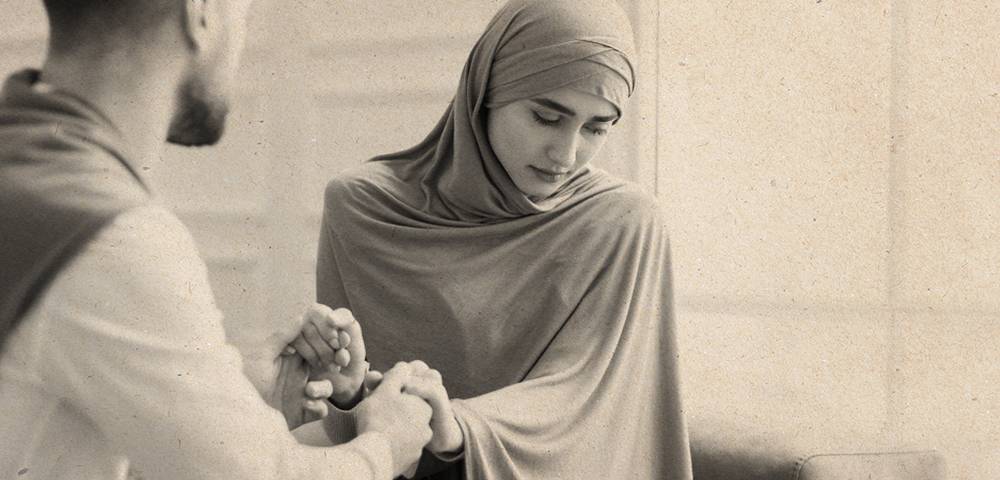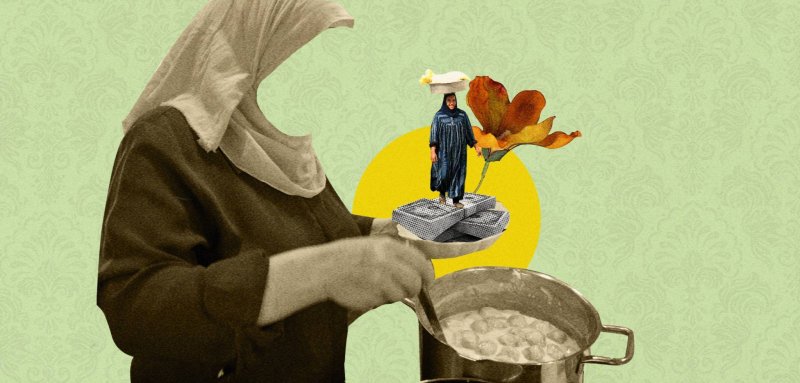The myth of love in the minds of many is based on the idea that a pretty young lady will marry a handsome man. He will provide her with everything she desires, and, in return, she will provide him with delicious food, a tidy house, and good offspring, and everyone will live in peace and happiness, making healthy boys and girls to enjoy this world.
We all know that reality does not always match this notion, and actually, in some cases the ‘fairytale’ story ends in family courtrooms and divorce procedures.
The strange thing is that the law in many countries of the region supports this view of things, and makes it a basis for the relationship between spouses. Therefore, we see it happening in most cases, along with gender norms that entrench the stereotypical roles of the heteronormative couple, in a way that suggests that this is the ideal or only image of the perfect family. Thus, the duties are distributed in a way that the husband is the sole breadwinner, exclusively responsible for spending on the family, while the woman alone must take care of their home and children.
Script & Reality... Do They Meet?
Lately, terms such as “marital property” or “shared wealth” are being used more frequently. These terms are used to refer to money and assets that were obtained by a joint effort between spouses throughout their period of marriage. In turn, demands have surfaced for the division of this shared wealth in the event of the death of either spouse or of a divorce.
These demands sparked a heated debate between those in agreement saying women are entitled to this money due to their efforts in the moral and financial development of the family during the period of marriage, and those opposing who consider this an injustice to men and a deviation from religion.
Dr. Mulki Al-Sharmani, Associate Professor of Islamic and Middle Eastern Studies at the University of Helsinki in Finland and a member of the Musawah Knowledge Building Working Group, tells Rassef22, “Shared wealth is an approach that gives value to the efforts of a woman and removes any injustices inconsistent with the divine purpose of marriage – which constitutes of compassion, cohesion, serenity, affection and mercy. However, the problem remains in finding an objective way to calculate the contribution of either party, without exaggerating the recognition of material contribution at the expense of contribution through effort. In short, we need a method that takes context into account and is also flexible enough to deal with varying situations.”
It is well known that originally in Islam, spending on the woman comes from a male family member (Husband, father, son/brother, uncle), otherwise the ‘Bayt al-mal’ (or “House of Wealth”, a financial institution responsible for the administration of taxes) will provide her with financial support.
Nevertheless, the wife's participation in household and family expenses is a welcome contribution for its additional support, but it does not waive her alimony as per Sharia Law, as confirmed in 2019 by the International Islamic Fiqh Academy (OIC) in the Islamic Conference in its 16th session in Dubai
Even so, the gap between script and reality remains wide, since separating a couple’s money in writing is completely different from doing so in reality. Spouses share a lot of financial responsibilities for the family, along with various costs of marriage. Women’s contribution to improving the conditions of the household has become something that cannot be dismissed, whether through their efforts at home and with the children, or through their work outside the home.
The philosophy of shared wealth between spouses stems from the fact that a woman working within the family is the one who enables her husband to work outside the house at ease, and in turn, enabling him to continuously improve and strengthen his financial situation.

Additionally, many wives directly contribute their income in order to spend on the family. Within this context, a 2011 study published in the Journal of Islamic Civilization indicated that 80% of the working women in the research focus group are forced to supply their salaries to family expenses. They are coerced through threats of divorce or through the denial of a number of rights, such as the freedom to leave the house and the like.
Moreover, statistics indicate that women support 33% of Egyptian families, 10.6% of Palestinian families, 30% of Lebanese families, 11% in Morocco, and 22.6% in each of the countries of Yemen and Sudan.
Hadeel Hazem, a program officer at one of Iraq’s international institutions tells Raseef22: “I find it difficult to answer yes or no to the idea of dividing shared wealth, because the wealth here depends on its source and the date of acquisition. So, if both parties are working and contribute in expenses, it could be divided between the two parties. But if the woman does not work outside the house, I believe in that case that only a percentage of the shared wealth could be calculated, since the woman will have also contributed to its formation.”
What Is Islam’s Point Of View?
The concept of marriage in Islam is based mainly on affection, compassion, trust and solidarity between both sides, so it is quite difficult to imagine the idea of the independence of financial responsibility. The concept remains theoretical, especially in light of the actual union of the debts of many spouses.
Naturally, this leads us to the conventional question, what is the Islamic Sharia’s opinion on the matter?
Women, ever since the rise of Islam, were unhappy with the injustice inflicted on them by male-dominated societies and their social norms, and this is confirmed by the story of Omar bin Al-Khattab’s ruling in the case of the widow Habiba Bint Zureik
Unfortunately, we are wrong in the way we formulate the question, because who among us can claim to have fully understood God's meaning in scripture? Sharia isn’t your understanding or mine, rather it is a broad horizon, open to many views and interpretations, as long as there is a basis to support them, and then there is no typical or standard answer.
Dr. Zahia Guero, Professor of Islamic Studies and Gender Studies at the Faculty of Letters, Arts and Humanities in Manouba, Tunisia tells Raseef 22: “Based on the incident of Habiba Bint Zureik, the Malikis singled out women who work and earn in what falls within the family’s property through verdicts independent of inheritance rulings. Ibn Al-Attar said: Imam Malik and his companions saw that if a woman works – such as weaving, spinning, and the like – then, in fairness between them both, she is the husband's partner in all that he benefited from her service.”
The story of Habiba Bint Zureik recounts how she went to Omar bin Al-Khattab when her husband Amro bin Al-Harith passed away, and his family took possession of all he left behind of the money and estates that they acquired together, through her work in weaving and embroidery, and his work trading with what she produced. So he decided to divide the money equally, where Habiba took half, and then a quarter of her husband's money by inheritance – since they had no children – and his family received the balance.
Guero adds that this incident indicates that ever since the rise of early Islam, women have not been satisfied with the injustices inflicted on them by male-dominated regimes and their social norms.
As for the legal aspect, we find, for example, that the Malaysian legislator relied on the Quranic verse 32 of Surat al-Nisa: {“For men is a share of what they have earned, and for women is a share of what they have earned”} where Allah determined that the rights of both men and women depend on the level of their effort and earnings. The court then decided to divide the money the family earned throughout the period of marriage between the two spouses, in the event of divorce or before the husband remarries another.
The journey to equality begins by clashing with unjust norms, changing the perception of the female as an insufficient individual, enacting laws that take the reality into account, and considering #Sharia jurisprudence supporting women's rights
The legislator also relied on customs and missionary interests that are closely related to the purposes of Islamic law (preserving the self/soul, religion, mind/reason, honor, and money), and in this case, the interest here is to preserve the woman's money.
The types of interests in question include considered interest, which is what Shariah considers based on legitimate evidence, and canceled interest, which contradicts Shari’a, and the sent interest, which has no legitimate evidence for its consideration or cancellation.
In the same context, the State Fatwa Committee in the Malaysian state of Selangor ruled in 2005 that in the event of the death of a spouse, the shared wealth must be divided, and the living party given his/her share before the distribution of the remaining shares. The wealth must be divided according to the size of their respective contributions, whether directly or indirectly, and all is distributed under the court’s close supervision.
Similarly, an amendment of the Algerian Family Law in 2005 saw the possibility of the financial management of the money acquired after marriage, whether there was a previous agreement upon the matter or not. Article 37 begins with the independent financial disclosure of each of the spouses as well as the monopoly of each one with his/her property, work revenue, and assets. According to the same article, the couple can agree to organize their money and property as well as their revenues starting from the date of marriage. In that case, that agreement must be recorded in a document separate from the marriage contract itself. This is what was stated in Article 49 of the Moroccan Family Code (‘Moudawana’): “Each of the spouses has an independent financial responsibility from the other, but it is permissible for them, in the framework of managing the money that will be acquired during marriage, to agree on its investment and distribution.”
What Does Context Say?
The issue of dividing marital funds cannot be discussed separately from other financial problems that the wife faces following divorce, such as the amount of alimony and the time required to obtain a divorce.
We must acknowledge that one of the biggest obstacles to a woman working is the endless domestic and caretaking duties that will make her bear double the burden if she decided to work outside the house. According to statistics, women spend more time than their male counterparts on housework and caring duties, ranging from two to ten times.
Looking closely, we will find that not considering a woman’s financial and caretaking efforts is part of the system of discrimination against her as well as a major lack of economic empowerment. It is a patriarchal system created by preconceived customs and norms, first carried out by removing the young lady from her education, then not allowing her to hold any assets after marriage “because it’s scandalous”, and finally by depriving her of her legal inheritance if it was a plot of land, and even bargaining with her on it.
The journey of equality begins by clashing with these unjust norms, first from changing the perception of the female as a lacking or insufficient individual, to working on enacting laws that take the current reality into account and tend to society’s needs.
Raseef22 is a not for profit entity. Our focus is on quality journalism. Every contribution to the NasRaseef membership goes directly towards journalism production. We stand independent, not accepting corporate sponsorships, sponsored content or political funding.
Support our mission to keep Raseef22 available to all readers by clicking here!
Interested in writing with us? Check our pitch process here!





